The Book of Exodus is the second religious book of the Bible. It is a narrative of the Exodus, the origin myth of the Israelites leaving slavery in Biblical Egypt through the strength of their deity named Yahweh, who according to the story chose them as his people. The Israelites then journey with the legendary prophet Moses to Mount Sinai, where Yahweh gives the 10 commandments and they enter into a covenant with Yahweh, who promises to make them a "holy nation, and a kingdom of priests" on condition of their faithfulness. He gives them their laws and instructions to build the Tabernacle, the means by which he will come from heaven and dwell with them and lead them in a holy war to conquer Canaan, which has earlier, according to the myth of Genesis, been promised to the "seed" of Abraham, the legendary patriarch of the Israelites.
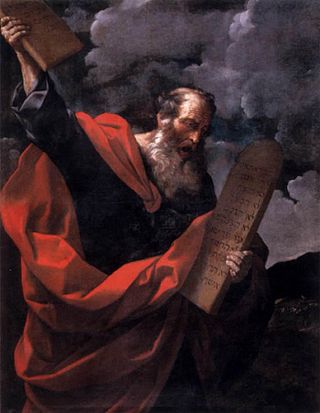
Moses is considered the most important prophet in Judaism and one of the most important prophets in Christianity, Islam, the Druze faith, the Baháʼí Faith, and other Abrahamic religions. According to both the Bible and the Quran, Moses was the leader of the Israelites and lawgiver to whom the authorship, or "acquisition from heaven", of the Torah is attributed.
Monolatry is the belief in the existence of many gods, but with the consistent worship of only one deity. The term monolatry was perhaps first used by Julius Wellhausen.
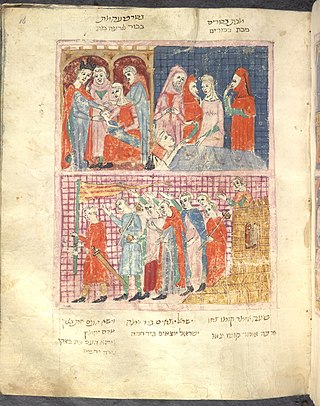
The Plagues of Egypt, in the account of the book of Exodus, are ten disasters inflicted on Biblical Egypt by the God of Israel in order to convince the Pharaoh to emancipate the enslaved Israelites, each of them confronting Pharaoh and one of his Egyptian gods; they serve as "signs and marvels" given by God to answer Pharaoh's taunt that he does not know Yahweh: "The Egyptians shall know that I am the LORD".

The Law of Moses, also called the Mosaic Law, is the law said to have been revealed to Moses by God. The term primarily refers to the Torah or the first five books of the Hebrew Bible.

Belshazzar's feast, or the story of the writing on the wall, tells how Belshazzar holds a great feast and drinks from the vessels that had been looted in the destruction of the First Temple. A hand appears and writes on the wall. The terrified Belshazzar calls for his wise men, but they are unable to read the writing. The queen advises him to send for Daniel, renowned for his wisdom. Daniel reminds Belshazzar that his father Nebuchadnezzar, when he became arrogant, was thrown down until he learned that God has sovereignty over the kingdom of men. Belshazzar had likewise blasphemed God, and so God sent this hand. Daniel then reads the message and interprets it: God has numbered Belshazzar's days, he has been weighed and found wanting, and his kingdom will be given to the Medes and the Persians.
That very night Belshazzar, the Chaldean [Babylonian] king, was killed. And Darius the Mede received the kingdom […]

The Exodus is the founding myth of the Israelites whose narrative is spread over four books of the Torah, namely Exodus, Leviticus, Numbers, and Deuteronomy.

The Ritual Decalogue is a list of laws at Exodus 34:11–26. These laws are similar to the Covenant Code and are followed by the phrase "ten commandments". Although the phrase "Ten Commandments" has traditionally been interpreted as referring to a very different set of laws, in Exodus 20:2–17, many scholars believe it instead refers to the Ritual Decalogue found two verses earlier.

The Ten Commandments, or the Decalogue, are a set of biblical principles relating to ethics and worship that play a fundamental role in Judaism, Christianity, and Islam. The text of the Ten Commandments appears twice in the Bible: at Exodus 20:2–17 and Deuteronomy 5:6–21.
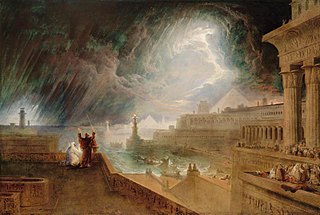
Va'eira, Va'era, or Vaera is the fourteenth weekly Torah portion in the annual Jewish cycle of Torah reading and the second in the Book of Exodus. It constitutes Exodus 6:2–9:35. The parashah tells of the first seven Plagues of Egypt.
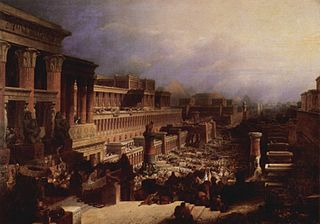
Bo is the fifteenth weekly Torah portion in the annual Jewish cycle of Torah reading and the third in the book of Exodus. The parashah constitutes Exodus 10:1–13:16. The parashah tells of the last three plagues on Egypt and the first Passover.

Beshalach, Beshallach, or Beshalah is the sixteenth weekly Torah portion in the annual Jewish cycle of Torah reading and the fourth in the Book of Exodus. It constitutes Exodus 13:17–17:16. In this parashah, Pharaoh changed his mind and chased after the Israelites, trapping them at the Sea of Reeds. God commanded Moses to split the sea, allowing the Israelites to escape, then closed the sea back upon the Egyptian army. The Israelites also experience the miracles of manna and clean water. And the Amalekites attacked, but the Israelites were victorious.

Yitro, Yithro, Yisroi, Yisrau, or Yisro is the seventeenth weekly Torah portion in the annual Jewish cycle of Torah reading and the fifth in the Book of Exodus. The parashah tells of Jethro's organizational counsel to Moses and God's revelation of the Ten Commandments to the Israelites at Mount Sinai.

Ki Tisa, Ki Tissa, Ki Thissa, or Ki Sisa is the 21st weekly Torah portion (parashah) in the annual Jewish cycle of Torah reading and the ninth in the Book of Exodus. The parashah tells of building the Tabernacle, the incident of the Golden calf, the request of Moses for God to reveal God's Attributes, and how Moses became radiant.
"With a strong hand and an outstretched arm" is a phrase used in the Bible to describe God's use of his power on behalf of Israel, particularly during the Exodus.
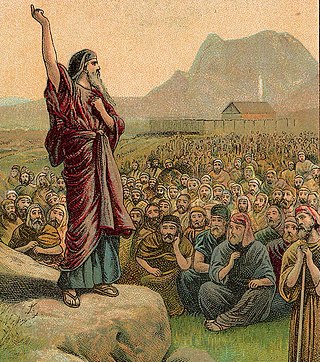
Va'etchanan is the 45th weekly Torah portion in the annual Jewish cycle of Torah reading and the second in the Book of Deuteronomy. It comprises Deuteronomy 3:23–7:11. The parashah tells how Moses asked to see the Land of Israel, made arguments to obey the law, recounted setting up the Cities of Refuge, recited the Ten Commandments and the Shema, and gave instructions for the Israelites' conquest of the Land. The parashah is made up of 7,343 Hebrew letters, 1,878 Hebrew words, 122 verses, and 249 lines in a Torah Scroll. Jews in the Diaspora generally read it in late July or August.

Eikev, Ekev, Ekeb, Aikev, or ʿEqeb is the 46th weekly Torah portion in the annual Jewish cycle of Torah reading and the third in the Book of Deuteronomy. It comprises Deuteronomy 7:12–11:25. The parashah tells of the blessings of obedience to God, the dangers of forgetting God, and directions for taking the Land of Israel. Moses recalls the making and re-making of the Tablets of Stone, the incident of the Golden Calf, Aaron's death, the Levites' duties, and exhortations to serve God.

Vayelech, Vayeilech, VaYelech, Va-yelech, Vayelekh, Wayyelekh, Wayyelakh, or Va-yelekh is the 52nd weekly Torah portion in the annual Jewish cycle of Torah reading and the ninth in the Book of Deuteronomy. It constitutes Deuteronomy 31:1–30. In the parashah, Moses told the Israelites to be strong and courageous, as God and Joshua would soon lead them into the Promised Land. Moses commanded the Israelites to read the law to all the people every seven years. God told Moses that his death was approaching, that the people would break the covenant, and that God would thus hide God's face from them, so Moses should therefore write a song to serve as a witness for God against them.

Discussions in rabbinic literature of the biblical character Moses, who led the Israelites out of Egypt and through their wanderings in the wilderness, contain various expansions, elaborations and inferences beyond what is presented in the text of the Bible itself.
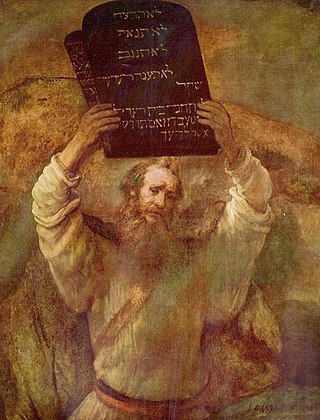
Mount Horeb is the mountain at which the Ten Commandments were given to Moses by God, according to the Book of Deuteronomy in the Hebrew Bible. It is described in two places as הַר הָאֱלֹהִים the "Mountain of Elohim". The mountain is also called the Mountain of YHWH.
















